This article was medically reviewed by Luba Lee, FNP-BC, MS. Luba Lee, FNP-BC is a Board-Certified Family Nurse Practitioner (FNP) and educator in Tennessee with over a decade of clinical experience. Luba has certifications in Pediatric Advanced Life Support (PALS), Emergency Medicine, Advanced Cardiac Life Support (ACLS), Team Building, and Critical Care Nursing. She received her Master of Science in Nursing (MSN) from the University of Tennessee in 2006.
There are 8 references cited in this article, which can be found at the bottom of the page.
wikiHow marks an article as reader-approved once it receives enough positive feedback. In this case, 100% of readers who voted found the article helpful, earning it our reader-approved status.
This article has been viewed 104,206 times.
Experts say constipation is very common, so you likely don't need to worry if you're occasionally backed up. You may be constipated if you're having fewer than three bowel movements a week, your stools are hard and lumpy, you're straining to have a bowel movement, or you can't pass a whole bowel movement.[1] Research suggests that you may not need to have a bowel movement every day, but you may be constipated if there's a change to your bowel movements.[2] Fortunately, you have options for treating your constipation so you can find relief.
Steps
Relieving Constipation Quickly
-
1Chew sugar-free gum. Sorbitol, a sweetener used in most sugar-free gum, is an ingredient in lots of laxatives. If you're suffering from a bout of constipation and want to get things moving, chew a couple pieces of sugar-free gum.
- Don't use this as a long-term solution. High levels of sorbitol can cause stomach irritation and other digestive problems.
-
2Drink some coconut water. Coconut water is increasingly popular as an after-workout drink, and it has natural laxative effects, as well as diuretic properties and other positive health benefits. Drink one bottle of coconut water to help relieve symptoms, or drink the milk of one raw coconut.
- Don't overdo it. Too much coconut water can have the opposite effect, giving you very loose stools.
Advertisement -
3Swallow a tablespoon of olive oil and lemon juice. If you're suffering from constipation, take a tablespoon of all-natural extra virgin olive oil and one tablespoon of lemon juice in the morning on an empty stomach. Olive oil is a common home remedy used to promote digestion and lubricate stool.
- Similarly, flax oil and orange juice is a common, but unverified, home remedy for constipation.
- In general, doctors do not recommend using mineral oil or castor oil for constipation remedies. Mineral oil can cause problems such as vitamin deficiencies, and castor oil can lead to long-term constipation.
-
4Drink warm lemon water. The benefits of drinking warm lemon water in the morning are somewhat hard to pin down, but this is an increasingly popular home tonic thought to have any number of weight-loss, skin care, and cold-prevention properties. It's true though that lemon juice stimulates liver function, helping you digest food more thoroughly, making your stools easier to pass.
- Drink one cup of warm water with a tablespoon of lemon juice added first thing in the morning, on an empty stomach. For added nutritional benefit and taste, add a small amount of raw honey and some turmeric powder.
-
5Try some live cultures. All-natural yoghurt, fermented kombucha drinks, and naturally-fermented sauerkraut are all excellent sources of probiotic bacteria, which are commonly used to treat digestive issues, including constipation and diarrhea. If you've been constipation as a result of viral infection or other illnesses, foods containing probiotics can be a solution.
- While the research regarding probiotic cultures and constipation is somewhat mixed[3] , and probiotics are typically used to treat diarrhea, it's true that intestinal flora is an essential part of overall digestive health.
- Some favor the prebiotic approach over the probiotic approach because if you feed your existing probiotics, you encourage growth of the good bacteria—as opposed to ingesting good bacteria from another source (typically cows). With prebiotics you are establishing your own stable healthy gut, and don’t have to rely on feeding it new bacteria. You create a situation of competitive exclusion whereby the bad bacteria is less able to find food to eat because the good bacteria is growing faster, outnumbering the bad bacteria and out-eating the bad bacteria.
-
6Drink a small amount of caffeine, temporarily. For a lot of people, a morning cup of coffee is a quick way to get things moving. The stimulant properties of caffeine do stimulate your intestinal muscles, making it somewhat easier to have a bowel movement. Drink a cup of coffee or some caffeinated tea in the morning to temporarily and quickly relieve constipation.
- Don't use this as a long-term solution to your morning toilet routine.[4] Coffee is a diuretic, which means it draws water out of your stools and makes them more difficult to pass. Limit your caffeine in-take as much as possible.
-
7Drink a cup of aloe vera juice. Available in most groceries stores, a few ounces of natural aloe vera juice every couple of hours can help to relieve constipation. Dried aloe vera is also commonly available in capsule form at natural food stores for use as a constipation treatment.
-
8Drink dandelion tea. Dandelions do have a purpose. Tea made from dandelion root is a common and effective constipation remedy, rich in phytonutrients. Dandelion root is used in a variety of natural herbal blends available commercially, for things as diverse as constipation relief, liver function, kidney function, and other digestive issues. It also tastes great and is widely available.
Preventing Constipation
-
1Drink more water. Sometimes, you just get backed up. But if you struggle with constipation regularly, lifestyle changes are in order. It's recommended that constipation sufferers drink as many as two liters of water a day, to prevent dry stool.[5]
- Carry a refillable liter bottle around with you during the day, and try to drink it through once before lunch, and once after. Easy to remember.
- Start your day with a glass of water to help you remember to keep drinking throughout the day.
- Avoid over-consuming alcohol. Alcohol and caffeine can both leech fluids from your system, causing drier stools.
-
2Eat more fiber. Possibly the single most important lifestyle change to keep things moving is getting enough fiber in your diet, which makes stool bulkier and softer. If you suffer from constipation, you need more fiber. Gradually increase the amount of fiber in your diet until you're getting at least 20 to 35 grams (0.71 to 1.2 oz) of fiber daily. Good fiber sources include:[6]
- Bran and other whole grains found in high-fiber cereals, breads, and brown rice
- Vegetables such as broccoli, brussels sprouts, carrots, and asparagus
- Dark and leafy greens like kale, spinach, and chard
- Fresh fruits, like apples, berries, plums, and pears
- Dried fruits such as raisins, apricots, and prunes
- Beans, legumes, and lentils
-
3Avoid saturated fats. A diet high in saturated fats often causes chronic constipation and other health problems. If you eat a lot of cheese and other dairy products, processed foods, and meat, this diet can make your constipation worse.
- Try replacing red meat with leaner sources of protein, like fish and beans.
- Try cooking more of your own meals, to avoid consuming too many processed and packaged foods, which are typically very high in saturated fats.
-
4Take a fiber supplement. Unlike laxatives, you can take fiber supplements, sometimes called "bulk-forming laxatives," every day. These help to make your stool bigger and softer. Although they are safe to use regularly, bulk-forming laxatives can interfere with your body's ability to absorb certain medicines, and they may cause bloating, cramps, and gas in some people. Drink a lot of water when you take a fiber supplement.[7]
- Common fiber supplements and bulk-forming laxatives available over the counter include Metamucil, FiberCon, and Citrucel.
-
5Exercise regularly. Moving your body and getting plenty of cardiovascular exercise will keep your bowels moving, too. Increasing the amount of energy you exert helps to wake up your digestive tract and keep your digestive system functioning properly.[8]
- Wait about an hour after a meal to exercise. You need to allow enough time for blood to flood to your stomach and digestive organs to allow for proper digestion.
- Just taking a walk after a meal can be one of the best types of exercise for promoting healthy bowel movements. Try to walk for at least 10-15 minutes three times a day, if you can.
-
6Make time available to use the toilet. Everybody's busy, but we all need to use the toilet on a regular basis. Regardless of what constipation treatment you use, give yourself enough time at a regular interval to sit on the toilet when you need to go. Don't wait, go now.[9]
- Never hold it in. Holding in the urge to go can make your constipation worse.
- If you regularly go in the morning, but rush right off to work, try waking up a little earlier and eating breakfast at home. Give yourself plenty of time to relax and use the toilet before you go off into the world.
-
7Chew your food more thoroughly. Many people miss out on one of the most important parts of the digestive process: chewing properly. Food starts being broken down in the mouth, where your saliva completes an important stage in the digestive process. Make sure you slow down while you're eating, taking the time to chew each bite several times.
- Poorly chewed food might not necessarily cause you to be constipated, but it can contribute to intestinal blockages, along with poor fiber, which can cause trapped gas and constipation. Chewing your food poorly makes constipation worse.
-
8Relax. Lots of constipation is caused by high levels of stress. If you're overworked, overbooked, and generally just stressed out, it can affect your digestive tract and result in constipation. Try to allow yourself regular breaks throughout the day, practicing different techniques to help calm yourself down and de-stress.
- Try meditating, or using progressive muscle relaxation, focusing your energy on flexing an individual muscle and moving that attention throughout the rest of the body progressively.
- Travel constipation is a regular problem for people. If you struggle to make your bowel movements regular when you're traveling, try to be proactive, by
-
9See a doctor or naturopath for long-term constipation. Most constipation is the result of poor diet. But chronic constipation can happen for a variety of reasons, including Irritable Bowel Syndrome (IBS), Crohn's disease, and other problems. It can also be the result of medicine you're taking. In that case, stopping the medicine or treating the problem should relieve your constipation.[10]
- Ask your doctor about using laxatives. There are a variety of types, including lubricant laxatives, osmotic laxatives, and stimulants. Laxatives can offer short-term relief, but might worsen the situation in the long run. If you have diabetes, ask your doctor before taking osmotic laxatives because they can cause electrolyte imbalances and other problems.
- Stool softeners such as Colace and Surfak make stools easier to pass by adding fluid to them. Having softer stool can prevent you from having to strain during bowel movements. Your doctor may recommend one of these products if your constipation is due to childbirth or surgery.
- A naturopath can give dietary and lifestyle advice, and look at any underlying health concerns.
Expert Q&A
-
QuestionHow does this work if I'm already constipated?
 Luba Lee, FNP-BC, MSLuba Lee, FNP-BC is a Board-Certified Family Nurse Practitioner (FNP) and educator in Tennessee with over a decade of clinical experience. Luba has certifications in Pediatric Advanced Life Support (PALS), Emergency Medicine, Advanced Cardiac Life Support (ACLS), Team Building, and Critical Care Nursing. She received her Master of Science in Nursing (MSN) from the University of Tennessee in 2006.
Luba Lee, FNP-BC, MSLuba Lee, FNP-BC is a Board-Certified Family Nurse Practitioner (FNP) and educator in Tennessee with over a decade of clinical experience. Luba has certifications in Pediatric Advanced Life Support (PALS), Emergency Medicine, Advanced Cardiac Life Support (ACLS), Team Building, and Critical Care Nursing. She received her Master of Science in Nursing (MSN) from the University of Tennessee in 2006.
Board-Certified Family Nurse Practitioner You can relieve your constipation by increasing your hydration levels, eating more fiber, and being more active. If this doesn't work, you can also try a laxative.
You can relieve your constipation by increasing your hydration levels, eating more fiber, and being more active. If this doesn't work, you can also try a laxative. -
QuestionI used to have constipation, and I am not any more. However, my parents freak out if I don't go just one or two days. Does this mean that I am constipated?
 Luba Lee, FNP-BC, MSLuba Lee, FNP-BC is a Board-Certified Family Nurse Practitioner (FNP) and educator in Tennessee with over a decade of clinical experience. Luba has certifications in Pediatric Advanced Life Support (PALS), Emergency Medicine, Advanced Cardiac Life Support (ACLS), Team Building, and Critical Care Nursing. She received her Master of Science in Nursing (MSN) from the University of Tennessee in 2006.
Luba Lee, FNP-BC, MSLuba Lee, FNP-BC is a Board-Certified Family Nurse Practitioner (FNP) and educator in Tennessee with over a decade of clinical experience. Luba has certifications in Pediatric Advanced Life Support (PALS), Emergency Medicine, Advanced Cardiac Life Support (ACLS), Team Building, and Critical Care Nursing. She received her Master of Science in Nursing (MSN) from the University of Tennessee in 2006.
Board-Certified Family Nurse Practitioner It's best to have a bowel movement daily, as it helps your body detox itself. Daily bowel movements help maintain your health and vitality, as well as prevent chronic diseases.
It's best to have a bowel movement daily, as it helps your body detox itself. Daily bowel movements help maintain your health and vitality, as well as prevent chronic diseases.
Warnings
- It might be painful when the waste comes out. Don't fret, just remind yourself it will be over soon and it is better than dealing with the pain that comes with constipation.⧼thumbs_response⧽
References
- ↑ https://www.nhs.uk/conditions/constipation/
- ↑ https://medlineplus.gov/constipation.html
- ↑ http://www.health.harvard.edu/blog/probiotics-may-ease-constipation-201408217377
- ↑ http://www.webmd.com/digestive-disorders/ss/slideshow-constipation-facts-10
- ↑ https://my.clevelandclinic.org/health/diseases/4059-constipation#management-and-treatment
- ↑ https://my.clevelandclinic.org/health/diseases/4059-constipation#management-and-treatment
- ↑ https://www.niddk.nih.gov/health-information/digestive-diseases/constipation/eating-diet-nutrition
- ↑ https://www.niddk.nih.gov/health-information/digestive-diseases/constipation/treatment
- ↑ https://www.nhs.uk/conditions/constipation/
About This Article
To deal with constipation quickly, start by chewing sugar-free gum since the sweetener is also in a lot of laxatives. You can also drink some coconut water, which has natural laxative effects. Other natural remedies include taking a tablespoon of olive or flax oil with lemon or orange juice, drinking warm lemon water, or having some aloe vera juice. In order to avoid constipation, drink more water throughout the day to prevent dry stool. Additionally, eat more fiber, including bran, fresh fruits, beans, and vegetables. For more tips from our Medical reviewer, including how regular exercise can combat constipation, keep reading!
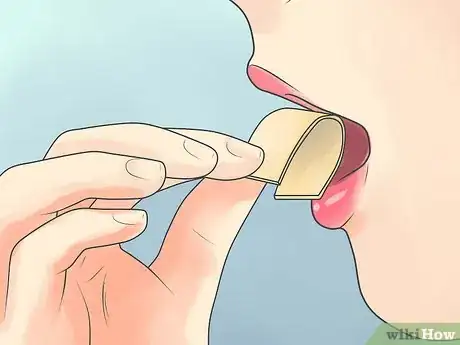

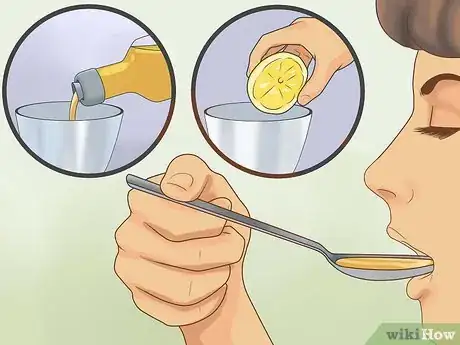

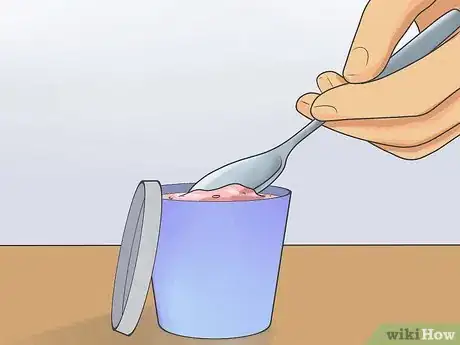

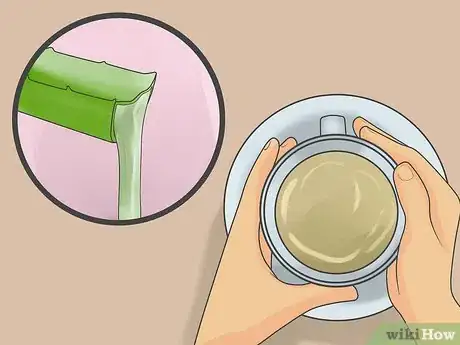












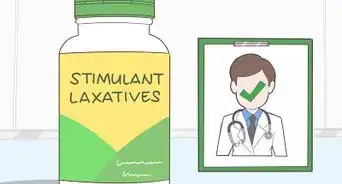

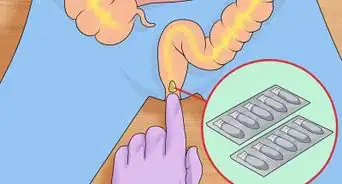



















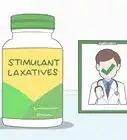




































Medical Disclaimer
The content of this article is not intended to be a substitute for professional medical advice, examination, diagnosis, or treatment. You should always contact your doctor or other qualified healthcare professional before starting, changing, or stopping any kind of health treatment.
Read More...